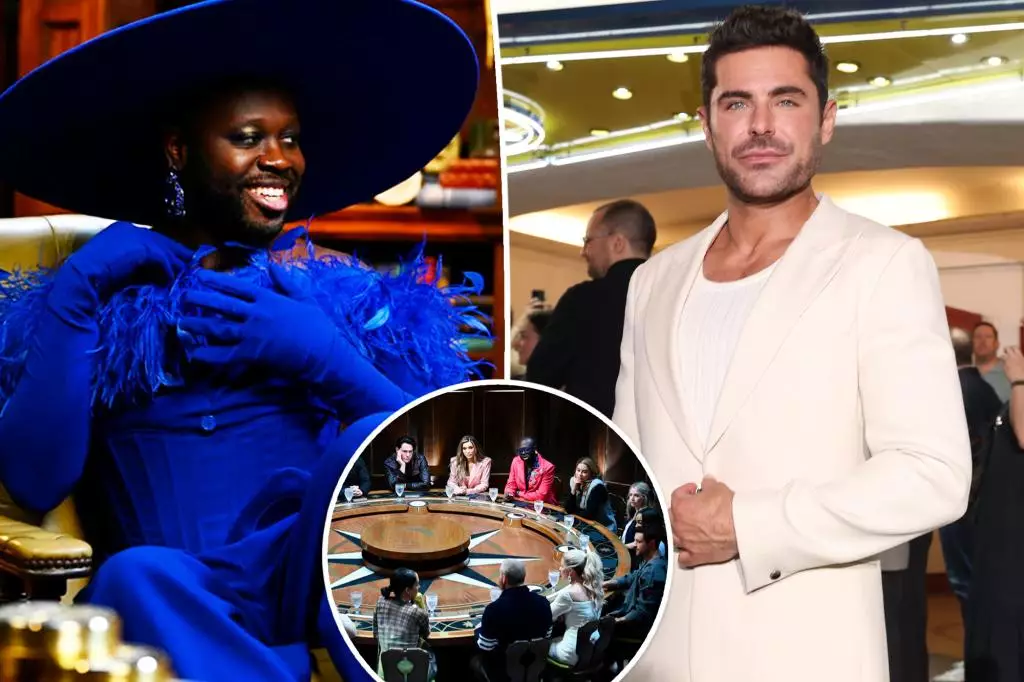In a recent episode of Peacock’s reality show “Traitors,” the tension was palpable as Bob the Drag Queen and Dylan Efron engaged in a biting exchange that highlighted the complexities of sibling dynamics, celebrity personas, and the game of deception. Seated at the notoriously tense roundtable, Dylan Efron, who is just 32, candidly expressed his belief that Bob was a traitor, drawing from his own experiences in the entertainment industry. Dylan’s assertion that playing the game silently would be a strategy a true traitor might adopt sets the stage for his argument, especially when he gave a nod to his brother Zac Efron’s career to embellish his point.
Bob, age 38 and a celebrated winner of “RuPaul’s Drag Race” Season 8, shot back with a sharp criticism of Zac’s acting skills, stating bluntly, “Not a good one.” This moment perfectly encapsulated the essence of sibling rivalry—strikingly personal, yet performed in public. The exchange not only shines a light on their contrasting approaches to honesty and performance in the realm of entertainment but also demonstrated how personal critiques can fuel engaging television drama.
Despite Bob the Drag Queen’s fierce rebuttal, Dylan managed to rally support from fellow contestants, including reality television savvy Boston Rob, leading to Bob’s elimination from Ardross Castle, where “Traitors” is filmed. The swift shift in alliance underscores a critical element of the show: the necessity for social acumen in the game of betrayal. The banishment scene was punctuated by Bob’s admission of guilt as a traitor—an acknowledgment that not only aids in building intrigue but also plays into the narrative that brings viewers back week after week.
Dylan’s success in orchestrating Bob’s exit received validation from fellow contestant Dolores Catania from “Real Housewives of New Jersey,” who lauded him with a commendatory “Good job, Dylan.” Yet, Dylan remained torn between the fondness for his brother’s craft and the emerging impression that Bob’s flamboyant persona was deadly adept at deception. This blending of admiration and rivalry illustrates the constant push and pull characteristic of sibling relationships in the public eye.
While Zac Efron is often recognized for his prominent roles and dazzling performances on the silver screen, Dylan has taken a more understated route behind the camera. He’s worn many hats, accruing experience as a production coordinator and assistant on notable projects, from “Jersey Boys” to “A Star Is Born.” His ventures into the realm of stunt work for high-profile series such as Disney+’s “The Mandalorian” also serve to showcase his versatility within the entertainment industry.
Zac has consistently supported Dylan’s pursuit of a career in front of the camera, recently voicing his optimism for his brother’s prospects on “Traitors.” This brotherly endorsement further exemplifies a supportive connection that transcends simple sibling rivalry. It adds another layer to their relationship—one that balances personal rivalry with mutual respect and encouragement.
The interactions between Bob the Drag Queen and Dylan Efron convey more than just a competition on “Traitors.” They reveal a nuanced portrait of familial ties, the complexity of individual careers, and the fine line between competition and camaraderie. This captivating interplay keeps viewers not only entertained but also invested in the lives of these public figures beyond their on-screen roles.

